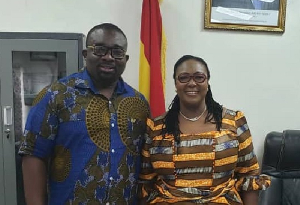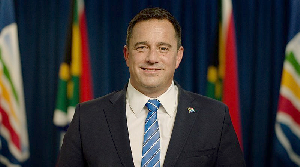Opinions of Sunday, 6 August 2023
Columnist: Mohammed Mubarique
Addressing moral decadence in Ghana: A comprehensive approach beyond establishing a national moral and Integrity council
On the 26th and 27th of July 2023, the Church of Pentecost at its convention centre at Gomoa Fetteh in the Central region, hosted a two-day National Development Conference.
The conference which was under the theme: ‘Moral Vision and National Development’ among other things strongly proposed the establishment of the National Moral and Integrity Council (NMIC) to deal with the increasing moral decadence in the country and its effects on national development.
While I commend the efforts of the esteemed members who put together the said proposal, I respectfully hold a different view on the relevance of the proposed NMIC. This is due to the following concerns:
Effectiveness
It is important to question whether creating a council alone can effectively address moral decadence. How are we going to measure and prove the impact of the council’s interventions on national development? I think addressing moral decadence requires a comprehensive approach that tackles underlying issues such as poverty, education, social inequality, and governance.
Merely establishing a council may overlook these root causes and focus on symptoms without achieving lasting change.
Prioritization of Resources
Secondly, establishing and maintaining a National Moral and Integrity Council requires financial and human resources. Given the limited resources available and the public concerns about the bloated size of our governments, couldn’t these resources be better utilized in strengthening existing institutions or addressing more pressing socio-economic challenges? I respectfully think addressing pressing social and economic challenges should be prioritized over moral policing.
Overlapping Functions
Ghana already has institutions in place, such as law enforcement agencies, religious organizations, and educational institutions, which play a role in addressing moral issues. Strengthening and coordinating these existing institutions may be a more efficient approach rather than creating a new council.
Overreach of Governmental Control
In a democratic state like Ghana, I am afraid establishing a council to regulate morals and integrity could lead to an expansion of government control over personal beliefs and behaviors, encroaching on individual freedoms.
So, what should be the way forward?
Moral attitude is a concept whose manifestations are determined by various factors operating at different strata of society. Thus, any move towards combatting a perceived moral decadence can only be effective if it addresses those multi-dimensional factors.
In the case of Ghana, I argue that without addressing the following factors which I believe are strongly linked to the perceived rise in moral decadence, there is no way we will see progress in our fight against our decaying moral attitudes.
Poverty
Addressing poverty is crucial in combating moral decadence. Poverty can contribute to moral decadence by creating a desperate environment where individuals may resort to unethical behavior to meet their basic needs. In fact, one of the consequences of poverty on citizens is a low level of patriotism.
As part of the social contract, the government is expected to provide opportunities for citizens to thrive both economically and socially; unfortunately, just like many African countries, successive governments in Ghana all expect a lot from the citizens but thus far have done very little to fulfill their part of the social contract by transforming the economic lives of the people.
How then do we expect citizens to show patriotism to such a country? So, if we are really serious about fighting the perceived rise in moral decadence, immediate steps should be taken to) implement policies and programs that promote economic growth and create job opportunities.
This can include initiatives such as entrepreneurship training, microfinance support, and access to credit for small businesses; b) establishment of social safety nets to provide assistance to vulnerable groups, including the poor, elderly, and disabled.
This can include programs such as cash transfers, food subsidies, and healthcare support in the form of free insurance and transport services for the aged; c) investment in infrastructure development, particularly in rural areas, to improve access to basic services such as clean water, healthcare facilities, and transportation.
This enhances living conditions and provides opportunities for economic growth, reducing poverty levels. By lifting people out of poverty, we can reduce desperation and the inclination towards immoral behavior. By addressing poverty through these comprehensive measures, Ghana can make significant progress in reducing moral decadence and promoting a more ethical society.
CULTURAL NORMS & VALUES
Apart from poverty, another factor that continues to contribute to the perceived rise in moral decadence is some aspects of our cultural norms and values. Below, I’ve briefly discussed two aspects of these norms and values that arguably play central roles in the perceived rise in moral decadence in the country:
1. The Norm of 'Gift Giving and Expectation'
One cultural norm deeply rooted in Ghanaian society is the practice of 'Gift giving and expectation.' While the act of giving gifts is known to symbolize gratitude and appreciation for someone’s support or deed, this norm has become an integral part of the mandatory procedures citizens are expected to follow when dealing with state institutions.
Failure to comply often results in frustrating experiences, prompting individuals to strictly observe these procedures. This has created a fertile ground for corruption, as some individuals exploit the system by offering gifts to expedite processes or gain preferential treatment as was seen in the
‘Contract for Sale’ expose by investigative journalist, Manasseh Azure Awuni. This undermines the values of fairness, equality, and ethical conduct. So, the detrimental effects of this cultural norm on moral attitudes cannot be overlooked.
2. The Idolization of Richness and Disdain for Poverty
Another aspect of Ghanaian cultural norms and values is the 'Idolization of richness' accompanied by a disdain for poverty. Societal emphasis on wealth and social status has fostered a mindset where individuals feel driven to exploit any means possible to acquire money and improve their self-worth.
This pursuit of material wealth and recognition fosters an environment where individuals, including those in public office, engage in corrupt or other immoral practices to achieve their aspirations. Recent social media competitions among Ghanaian celebrities, showcasing opulent houses, luxury cars, and vast wealth, exemplify society's obsession with material wealth.
Moreover, the emergence of the Sakawa boys, involved in internet fraud to attain quick riches and social recognition, further illustrates the repercussions of this cultural value.
To combat this issue effectively, it is essential to intervene at the educational level. By integrating appropriate cultural values into the educational system, Ghana can instill positive virtues and reshape societal attitudes.
For instance, promoting patriotism can foster a sense of pride and responsibility towards the nation, encouraging individuals to act in the best interest of their country. Emphasizing the value of hard work can cultivate a work ethic based on merit and discourage the pursuit of wealth through illicit means.
Moreover, incorporating a dislike for tipping can help reduce the prevalence of bribery and corruption, promoting fairness and ethical conduct. Education plays a pivotal role in shaping the values and beliefs of future generations. By emphasizing the importance of ethical conduct, integrity, and social responsibility, the educational system can contribute to the transformation of Ghanaian society.
SOCIAL REPRESENTATION OF PUBLIC OFFICE HOLDERS
Another factor that contributes to the perceived rise in moral decadence in Ghana is the social representation of public officeholders. Public officeholders are seen by the public as rich people.
Thus, an opportunity to serve in public office is considered as a breakthrough in one’s pursuit of economic emancipation. Consequently, these individuals face immense expectations from both their families and society. They are frequently approached for financial assistance at social functions and are expected to resolve private problems, such as paying school fees, rent, and daily expenses. Faced with these overwhelming demands, some public officeholders resort to illegitimate means to maintain a comfortable lifestyle.
The question is, what contributes to this social representation of officeholders? In my view, the following two key actors are responsible for this:
1. Luxurious Lifestyles: The opulent lives led by public office holders, characterized by the use of expensive cars, purchasing of lavish houses, and wearing of expensive clothes create an illusion of affluence. This display of wealth is often influenced by the hierarchical nature of Ghanaian society, where leaders are expected to exude a sense of "class" to command respect from subordinates. Consequently, public officials feel compelled to maintain an image of affluence, leading to the perception that their positions offer significant personal wealth.
2. Poor Civic Education: A lack of knowledge and understanding about the responsibilities of public office holders coupled with the absence of transparency regarding how much they earn contribute to the misrepresentation.
So, what is the way forward?
To address this issue, two key steps can be taken. Firstly, there is a need to educate the public about the roles and responsibilities of public office holders, as well as the impact of social expectations on their ability to fulfill those duties. This will help dispel misconceptions and foster a more realistic understanding of the challenges faced by these individuals.
Secondly, it is crucial to enforce transparency and accountability in public office by making it mandatory for officeholders to publicly declare their assets both before and after their term. This measure ensures that public officials are held accountable for their financial dealings and helps restore trust in the system by promoting integrity and discouraging illicit financial activities.
In conclusion, the two-day National Development Conference held by the Church of Pentecost on the theme 'Moral Vision and National Development' brought to the forefront a critical issue of moral decadence in Ghana and its impact on national progress.
However, the proposal to address this issue through the establishment of NMIC in my considered opinion is not sustainable. My concerns about the NMIC revolve around its potential effectiveness, prioritization of resources, overlapping functions with existing institutions, and the risk of governmental overreach into personal beliefs and freedoms.
Addressing moral decadence requires a comprehensive approach that tackles underlying factors such as poverty, education, social inequality, and governance. Simply creating a council may not guarantee the desired impact on societal values and behavior.
GOD BLESS OUR NATION













